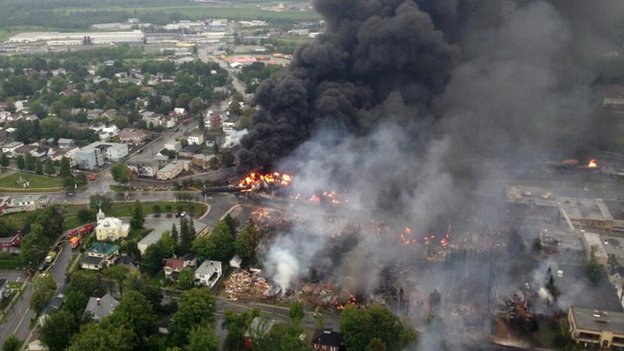Today, as hundreds of people joined First Nations leaders to walk 14 kilometers through the tar sands in Fort McMurray on the Tar Sands Healing Walk, news of several new oil disasters spread through the crowd and over social media networks.
Details are sparse so far on an oil spill reported in the Athabasca River near the Poplar Grove First Nation. Members of the Athabasca Chipewyan First Nation oil spill response team report seeing a 5 kilometer-wide oil slick spanning the width of the river. Stay tuned for details. **Update July 11: ACFN testing reveals the oily sheen on the river likely resulted from a blue-green algae bloom.**
Meanwhile, in the eastern Quebec town of Lac-Megantic, rescue workers are searching for survivors of a series of deadly explosions that followed the derailment of a train carrying crude oil originating from North Dakota’s Bakken Shale.
At least one person is dead, an estimated 60 town residents are missing, crude oil has spilled into Megantic Lake and the Chaudiere River, and the inferno has destroyed some 30 buildings. The disaster in the middle of the night led to the evacuation of 1,000 residents.
The first explosion occurred shortly after 1 a.m., sending fireballs through the downtown core, where a popular bar with an unknown number of patrons was reportedly destroyed completely. Residents, who say the first blast felt like “an atomic bomb,” ran towards the scene of the first explosion, only to be surprised by several more explosions.
The train, owned by American company Montreal Maine & Atlantic Railway Ltd, was likely carrying the Bakken light crude to a refinery in Saint John, New Brunswick, according to sources familiar with the line.
According to BBC News, “the train’s 73 cars reportedly uncoupled from a parked engine and derailed,” reportedly at a high rate of speed.
The Montreal, Maine & Atlantic train had five locomotive engines and 73 cars filled with light crude oil, and was parked outside Lac-Megantic during an overnight driver shift-change, a company spokesman told Canada’s La Presse newspaper.
The cars filled with fuel somehow became uncoupled, causing them to roll downhill into the town and derail.
Officials have set up a 1-kilometer exclusion zone around the town center, fearing further explosions as fire crews from as far away as Maine battle the ongoing blaze.
Watch a bit of footage following the explosions:
Subscribe to our newsletter
Stay up to date with DeSmog news and alerts







